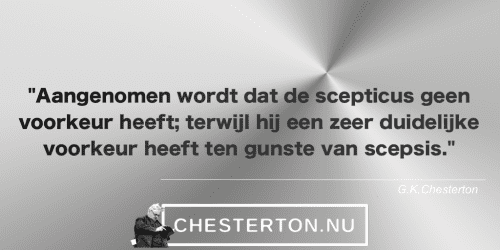
Waarom komt U ons hinderen
Een bijdrage van: Willem Jan Otten Er is ergens een wrak, en wij zijn aangespoeld. Orthodoxie is verschenen in 1908. De titel zou nu, in tijden van fundamentalismevreze, een provocatie zijn, en was het destijds in Londen minstens evenzeer. De dood van God, de bevrijding van dogmatische beknellingen, en een

 Welkom bij Chesterton.Nu op ZinVolZin, een unieke ruimte waar we de tijdloze wijsheid, gedachten en werken van G.K. Chesterton onder de loep nemen. Chesterton, een veelzijdige schrijver, filosoof en christelijk apologeet, blijft een inspiratiebron voor velen dankzij zijn scherpe inzichten en meeslepende verhalen.
Welkom bij Chesterton.Nu op ZinVolZin, een unieke ruimte waar we de tijdloze wijsheid, gedachten en werken van G.K. Chesterton onder de loep nemen. Chesterton, een veelzijdige schrijver, filosoof en christelijk apologeet, blijft een inspiratiebron voor velen dankzij zijn scherpe inzichten en meeslepende verhalen.































